Mumbai University’s downward spiral
Founded in 1857 and one of the first three universities to be established in the British presidencies, this once highly-reputed varsity with a roll-call of illustrious alumni including Lokmanya Tilak and Dr. Ambedkar, is facing an unprecedented meltdown, with its academic reputation at its nadir. Summiya Yasmeen & Praveer Sinha report
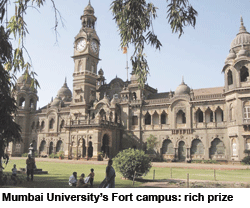 At an impressive convocation ceremony of the University of Mumbai held on the last day of 2012 at its 156-year-old heritage Fort campus, dominated by its landmark Indo-Saracenic Rajabai clock tower, chief guest President Pranab Mukherjee exhorted India’s institutions of higher education to reinvent themselves to deliver relevant knowledge and actionable skills. “All universities in India will need to reinvent themselves as enablers of society and not remain just gatekeepers of higher education,” Mukherjee said in his convocation address.
At an impressive convocation ceremony of the University of Mumbai held on the last day of 2012 at its 156-year-old heritage Fort campus, dominated by its landmark Indo-Saracenic Rajabai clock tower, chief guest President Pranab Mukherjee exhorted India’s institutions of higher education to reinvent themselves to deliver relevant knowledge and actionable skills. “All universities in India will need to reinvent themselves as enablers of society and not remain just gatekeepers of higher education,” Mukherjee said in his convocation address.
The President’s clarion call to India’s 611 universities to reinvent themselves is particularly apposite advice for the state government-funded University of Mumbai (MU) which boasts 667 affiliated colleges with an aggregate enrolment of 650,000 students in India’s commercial capital. Founded in 1857 and one of the first three universities (Calcutta and Madras (1857) are the other two) to be established in the British presidencies, this once highly-reputed university with a roll-call of illustrious alumni including Lokmanya Tilak, Dr. B.R. Ambedkar and Nani Palkhivala, is facing an unprecedented meltdown, with its academic reputation at its nadir. From shortage of faculty and administrative staff, obsolete curriculums, exam malpractices and marks card scandals to widespread political interference in faculty appointments and administration, MU seems to be afflicted with every conceivable malaise.
2012 was a particularly bad year for MU, marked by a string of administrative gaffes. Exam hall tickets that were supposed to be issued online could not be accessed; exam centres were re-allotted to more than 2,100 students just hours before they took the first exam; the marketing and human resource management question paper of the third year B.Com degree programme was leaked and disseminated through sms and mobile apps, landing the issue in the Bombay high court; and distance and open learning B.Com students got a “wrong” question paper in 19 centres. In 2011, there was a four-month delay in the declaration of results of the M.Com exam and in 2010, discrepancies in the university’s optical mark recognition (OMR) code system led to answer sheets of 100 students getting mixed up.
While these instances could be excused as administrative failures perhaps inevitable in an institution with the size and diversity of MU, consistently slipping administrative and academic standards are widely attributed to political interference, especially the improper and suspect top-level vice chancellor and pro vice chancellor appointments in this 156-year-old university. With its huge budget of Rs.376 crore per year, MU is a rich prize for Maharashtra’s notoriously corrupt politicians, adept at generating illegal income streams and building patronage networks while simultaneously pushing sons-of-the-soil and caste-based employment agendas, academic standards be damned.
The routine interference of the state’s avaricious politicians in MU’s affairs bears an uncanny resemblance with the modus operandi of the Communist Party of India-Marxist (CPM) of West Bengal on the eastern seaboard of the country. During its 34 years of uninterrupted rule (1977-2011) in the state, the CPM packed the boards and faculties of highly reputed colleges and universities with party members to the almost utter destruction of academic standards. Likewise in Maharashtra, Congress, BJP and Shiv Sena politicians who control the state (and local) government which massively subsidises MU, have packed the boards and faculty of MU with their neo-literate, under-qualified members and kith and kin.
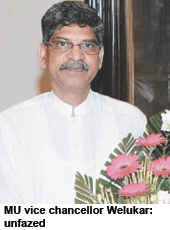 For instance, in July 2010 Dr. Rajan Welukar, an obscure Nagpur-based statistician with a Masters degree and Ph D in statistics from Nagpur University, who never attained the rank of professor or college principal — prerequisites of a vice chancellor under the Maharashtra Universities Act, 1994 — was appointed vice chancellor despite not being shortlisted by a government-constituted search committee, chaired by well-known Delhi-based sociologist Andre Beteille. In January 2010, when the search committee shortlisted five eminent academicians, Welukar’s name was not in the list. January 20 and 21 were fixed as dates for the final interview by then governor of Maharashtra and ex officio chancellor of MU, S.C. Jamir. But on January 16, Jamir was replaced as governor by the Congress-led UPA government in Delhi.
For instance, in July 2010 Dr. Rajan Welukar, an obscure Nagpur-based statistician with a Masters degree and Ph D in statistics from Nagpur University, who never attained the rank of professor or college principal — prerequisites of a vice chancellor under the Maharashtra Universities Act, 1994 — was appointed vice chancellor despite not being shortlisted by a government-constituted search committee, chaired by well-known Delhi-based sociologist Andre Beteille. In January 2010, when the search committee shortlisted five eminent academicians, Welukar’s name was not in the list. January 20 and 21 were fixed as dates for the final interview by then governor of Maharashtra and ex officio chancellor of MU, S.C. Jamir. But on January 16, Jamir was replaced as governor by the Congress-led UPA government in Delhi.
Commenting on the issue, a report in the Delhi-based weekly Outlook (April 16, 2012) quoted a letter written by Jamir to then Maharashtra (Congress) chief minister Ashok Chavan, alleging political interference and nepotism in the appointment of the VC. “I feel it is my duty to point out nefarious activities of the vested interests… they are seeking escape routes and have resorted to unethical networking, contacting political leaders and NGOs (to) put pressure on the authority to reverse the process,’’ wrote Jamir. His successor to the governor’s post K. Sankaranarayanan appointed a new committee, chaired by Dr. A. Kolaskar (a former associate of Welukar), which duly recommended him for the post, and Welukar was officially appointed VC of Mumbai University on July 6, 2010.
| MU: Quick facts
Established: 1857 |
Almost three years into the job and the series of scams and scandals in MU notwithstanding, Welukar is unfazed. “When I took over as vice chancellor in 2010, no academic bodies were in place. All areas, from teachers, students, to colleges and courses were outdated and needed improvement. I accepted the challenge of addressing the many problems of the university. I admit of late there have been few errors. I don’t subscribe to errors, they are unacceptable. But at the same time one has to take into account that the system of operations is vast and a single person cannot be blamed. I have held meetings with the board of examinations to ensure no student suffered, and also suspended the person responsible for the errors. There are several issues — quality, research, manpower and governance — on which we need to focus and take corrective steps. Improvement is a continuous process and it will take time,” says Welukar (see interview).
Welukar’s manipulated appointment as VC of this vintage university aroused anger and indignation within the MU faculty which still rankles. In the months following his appointment, faculty members jointly and severally addressed protest petitions to governor K. Sankaranarayanan as well as chief minister Prithviraj Chavan to initiate an official enquiry into the VC’s academic credentials. In one of the petitions, faculty members wrote: “The VC is expected to be an eminent scholar in his/her field who will be able to lead and inspire university faculty by personal example. His appointment has been accompanied by allegations of a lack of transparency from the very beginning. This was followed by the controversy over the withdrawal of Rohinton Mistry’s book Such a Long Journey from the SYBA (English) syllabus. The latest allegations refer to the number and quality of Dr. Welukar’s publications as well as to the fact that he has not mentioned when he acquired his Ph D degree in the curriculum vitae he submitted for selection to the post of vice chancellor… We request you to help restore the credibility of the highest academic position in the university by instituting an impartial enquiry regarding the allegations raised about Dr. Welukar’s academic credentials.”
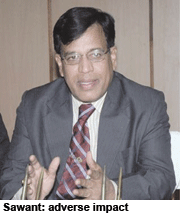 Moreover in September 2010, former MU pro vice chancellor Dr. A.D. Sawant filed a writ petition in the Bombay high court challenging Welukar’s appointment. The petition alleged that Welukar didn’t possess the basic, essential qualifications or the experience required for the office of vice chancellor and demanded quashing of the appointment. On August 10, 2011, a two-judge bench of the high court delivered a split verdict following which the case has been referred to a new bench and is pending adjudication.
Moreover in September 2010, former MU pro vice chancellor Dr. A.D. Sawant filed a writ petition in the Bombay high court challenging Welukar’s appointment. The petition alleged that Welukar didn’t possess the basic, essential qualifications or the experience required for the office of vice chancellor and demanded quashing of the appointment. On August 10, 2011, a two-judge bench of the high court delivered a split verdict following which the case has been referred to a new bench and is pending adjudication.
“Welukar is patently unqualified for the position of vice chancellor. There has been gross breach of established rules in his appointment. Under s. 13(2) of the Maharashtra Universities Act (1994), a person cannot be appointed vice chancellor unless he has served as professor/principal of a college or institution and has over 15 years of teaching experience. The incumbent VC does not have even the latter qualification, leave aside other qualifications specified in the Act. After two years, the case will now be heard all over again by a new division bench. A decision has to be taken on the credentials of the VC as it’s adversely affecting the functioning of the university and the quality of education,” says Sawant.
Confirming the worst fears of faculty members and critics, during the two years he has been in office, Welukar has attracted a charge of awarding a contract to handle all MU examination processes and paperwork to the Maharashtra Knowledge Corporation Ltd (MKCL), a company on whose board he serves as a member. But Welukar is not the only top administrator of MU to be charged with corruption. In 2002, following complaints of corruption and malpractice, Dr. S.D. Karnik, pro vice chancellor of MU, was suddenly dismissed without charges being filed. Shortly thereafter, he was appointed chairman of the Maharashtra Public Services Commission (MPSC) and promoted to the Union Public Services Commission. But nemesis caught up with him in Delhi when he was arrested by the Anti-Corruption Bureau for large-scale corruption during his brief tenure as MPSC chairman.
Steady erosion of its autonomy, ham-fisted political interference, corruption and nepotism have taken a heavy toll on this once respected institution of higher education, and have dented its national and international reputation. In 2006, MU was ranked No. 452 in the Times Higher Education-QS World University Rankings of the world’s top 500 universities. Since then it has been consistently downgraded.
In the QS World University Rankings 2010-11, MU was ranked No.493 and in 2011-12 was pushed out of the Top 500 to be ranked 578. Exit from the QS Top 500 league table prompted the university’s management to allocate Rs.10 lakh for a study on the ‘Mission to be in the top 200 universities in the world’ in 2008. Typically, four years on the findings/recommendations of this study are yet to be submitted.
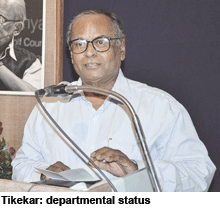 Aroon Tikekar, a well-known journalist, historian and author of The Cloister’s Pale: A Biography of the University of Mumbai (2006) which interweaves the history of the university with the history of the city, attributes the precipitous decline of academic standards in MU to persistent bureaucratic and political interference which has ensured the appointment of progressively low-calibre vice chancellors.
Aroon Tikekar, a well-known journalist, historian and author of The Cloister’s Pale: A Biography of the University of Mumbai (2006) which interweaves the history of the university with the history of the city, attributes the precipitous decline of academic standards in MU to persistent bureaucratic and political interference which has ensured the appointment of progressively low-calibre vice chancellors.
“After the Maharashtra Universities Act, 1994 came into effect, the university has been reduced to the status of any government department. The position of vice chancellor became a salaried, full-time one, thus giving college and university teachers an opportunity for career advancement. However, the same Act also devalued the office and enabled political interference. The politicisation of the university accelerated when politicians assumed the role of self-styled education barons and began promoting colleges of their own. Once political patronage gained credence, it was easy for bureaucrats to make inroads into the university and begin breaching the autonomy of the institution. In this murky scenario, appointing chosen favourites as VC assumed great importance. The more amenable the vice chancellor, the easier it became for politicians to affiliate their colleges. Every education minister and even education secretary became interested parties in selecting vice chancellors who took the line of least resistance against their machinations. The vice chancellor is no longer an intellectual and cultural leader but a mere pawn in the hands of the state’s ruling politicians,” laments Tikekar.
The across-the-board politicisation of MU is evident in the composition of the highest decision-making authority of the varsity — its 105-member senate — which comprises the chancellor, vice chancellor, director of higher education, among others and 21 nominated and 61 elected members. While nominated members are mostly political appointees, elected members of the senate are also sponsored by political parties including the Shiv Sena, Maharashtra Navnirman Sena (MNS) and the Congress. With the senate empowered to approve MU’s annual budget, and sanction and monitor expenditure under various heads of account and approve all faculty appointments, opportunities for favouritism, kickbacks and commissions are numerous. With MU’s annual budget at Rs.376 crore (2012-13), the appointment of registrars, faculty, vice chancellor, and senate members has become highly politicised, with politicians of all hues and stripes desperate to appoint cronies to key positions.
With politicians tightly controlling the university, tuition fees in MU and its affiliated, aided colleges have remained almost static for several decades with student fees and levies contributing barely 10 percent of the varsity’s annual expenditure against the recommended 20 percent norm. Consequently, affiliating colleges — anxious to acquire the Mumbai University stamp of approval — has become an accepted method of generating revenue (colleges pay an affiliation fee of Rs.1.25-3.5 lakh). The scramble for affiliation is also useful for MU officials and senate members as promoters of colleges of dubious reputation are ready, willing and able to pay substantial amounts — more than the affiliation fee — for the MU tag.
Consequently the number of colleges affiliated with MU has steadily increased from 388 in 2002-03 to 667 in 2011-12, with a massive aggregate student population of 653,754 currently, an increase of 71.44 percent over the past decade. Moreover, a five-year perspective plan approved by the MU senate in October last year proposes a further increase in the number of affiliated colleges.
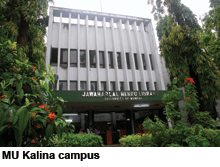 With tuition fees stagnant and the official affiliation fee levied nominal, MU’s investment in infrastructure, administration and faculty (whose remuneration was doubled by the Sixth Pay Commission in 2008 with retrospective effect from 2006) hasn’t been able to keep pace. According to a recent Central Advisory Board of Education (CABE) Committee report (November 5), the affiliation system is adversely affecting the quality of higher education in India’s most industrial state (pop. 112 million).
With tuition fees stagnant and the official affiliation fee levied nominal, MU’s investment in infrastructure, administration and faculty (whose remuneration was doubled by the Sixth Pay Commission in 2008 with retrospective effect from 2006) hasn’t been able to keep pace. According to a recent Central Advisory Board of Education (CABE) Committee report (November 5), the affiliation system is adversely affecting the quality of higher education in India’s most industrial state (pop. 112 million).
The report reveals that Maharashtra’s 20 universities have the highest number of affiliated colleges — 4,631 — countrywide closely followed by Andhra Pradesh (4,066), Uttar Pradesh (3,859) and Karnataka (3,078). “A large section of administrative and academic human resource machinery of universities is used to manage affiliated colleges, limiting academic productivity time to innovate and create new knowledge,” comment the authors of the report.
In response to the CABE Committee report, the Maharashtra state government appointed a panel to find ways and means to address the ballooning sizes of Mumbai, Pune and Nagpur universities. In its report submitted recently, the panel has recommended bifurcation of universities with more than 300 affiliated colleges. “Administration becomes difficult with more than 300 colleges. The heavy burden on universities should be brought down by establishing autonomous examination boards. Affiliated colleges should be granted performance-based autonomy, which should be reviewed periodically. This would enable autonomous institutions to innovate and reduce burden on universities,” states the panel’s report.
Currently only six affiliated colleges (St. Xavier’s College, H.R. College, among others) have been granted autonomous status by MU. Even though there are several other high-profile affiliated colleges (Sophia, Elphinstone, Wilson, Jai Hind, etc) which have good reputations and whose degrees carry more weight within India Inc than Mumbai University certification, the management is reluctant to confer autonomy upon them. All autonomous colleges are allowed to prescribe their own syllabus and conduct their own examinations while awarding degrees of the parent university.
Quite clearly supervising the operations, conducting examinations and awarding degrees to 650,000 students of 667 affiliated colleges, has stretched the resources of Mumbai University to breaking point, leaving little time or capacity for supervision of post-graduate education and undertaking of research projects which should be its top priorities. Currently MU’s 54 post-graduate departments which include institutions and centres of study, have an abysmal research record. A recent RTI (Right to Information) application has revealed that there’s been a 58 percent decline in Ph Ds awarded during the past four years. In 2008, 325 students were awarded doctorates with the number declining to 134 in 2011.
Meanwhile under the rising examinations and administrative load, academic and infrastructure facilities at MU have gone from bad to worse. The university’s original Fort campus adjoining the high court which was built in 1857 — the year Dr. John Wilson founded the university consequent upon ‘Wood’s Education Dispatch’ — houses its administrative offices and the contiguous Rajabai clock tower hosts the library. According to a university professor who preferred to remain anonymous, the library resembles a “godown and will soon crumble under the onslaught of pests, damp and neglect”. The university’s new 230-acre Kalina campus constructed in minimalist PWD style which houses the undergraduate and postgraduate faculties, modest classrooms, laboratories and a library, has gone to seed. It’s evident the buildings and facilities haven’t been maintained or upgraded in years. The seven student hostels — two on the Fort campus and five at Kalina — are overcrowded with unhygienic kitchens.
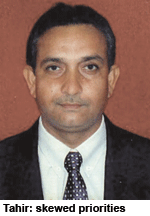 “Though the facilities of Mumbai University are adequate, we can’t compare them with the infrastructure offered by other premier institutions such as Delhi, Benares Hindu and Aligarh Muslim universities. In most affiliated colleges, facilities are unsupportive and inadequate. The university must prioritise and use its resources for improving infrastructure. Instead of spending Rs.200 crore on building an international convention centre, the university should use the money to build modern hostels for students. Currently, the combined capacity of all the seven hostels is 555, but 1,500 students live in them. Moreover, the teacher-student ratio is very high at 1:65,’’ says Prof. Mohammed Tahir, joint secretary of the Bombay University and College Teachers’ Union, who adds that the faculty has been completely sidelined by the university management with no say in issues related to academic and curriculum development.
“Though the facilities of Mumbai University are adequate, we can’t compare them with the infrastructure offered by other premier institutions such as Delhi, Benares Hindu and Aligarh Muslim universities. In most affiliated colleges, facilities are unsupportive and inadequate. The university must prioritise and use its resources for improving infrastructure. Instead of spending Rs.200 crore on building an international convention centre, the university should use the money to build modern hostels for students. Currently, the combined capacity of all the seven hostels is 555, but 1,500 students live in them. Moreover, the teacher-student ratio is very high at 1:65,’’ says Prof. Mohammed Tahir, joint secretary of the Bombay University and College Teachers’ Union, who adds that the faculty has been completely sidelined by the university management with no say in issues related to academic and curriculum development.
The fallout of poor infrastructure, outdated curriculums and severe faculty shortage is that the acceptability and market value of Mumbai University degrees and certification is fast losing credibility. On May 4 last year, an employability test conducted for undergraduate students enroled in several MU-affiliated colleges resulted in major embarrassment. Of the 5,000 students who wrote the test conducted by Mumbai University and the Delhi-based Aspiring Minds, a mere 50 were adjudged employable. Earlier in December 2011, when the same test was conducted in Mumbai’s Thakur College of Science & Commerce, none of the 930 final year BA/B.Sc/B.Com students passed it. This year 150,000 students enroled in 400 affiliated arts, science and commerce colleges are expected to write the test. Moreover, despite being sited in the financial and commercial capital of India — Mumbai contributes to over 26 percent of the state’s GDP and 6 percent of India’s GDP — Mumbai University has failed to develop mature linkages with Indian industry to contemporise its study programmes.
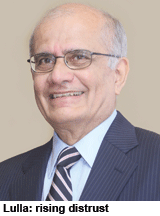 “Most universities and colleges in India including Mumbai University, offer impractical and obsolete curriculums out of sync with employer needs. Therefore increasingly, companies and entrepreneurs are testing and assessing MU graduates rigorously. This reflects rising distrust of MU’s certification. To increase the market value of its degrees, MU must immediately upgrade its curriculums, introduce internship programmes, and collaborate with Indian industry to tailor its study programmes with the needs of industry,’’ says Suresh Lulla, an alumnus of IIT-Bombay and Wayne State University, Detroit and founder-managing director of Qimpro Consultants Pvt. Ltd, Mumbai, which offers training and certification to working professionals.
“Most universities and colleges in India including Mumbai University, offer impractical and obsolete curriculums out of sync with employer needs. Therefore increasingly, companies and entrepreneurs are testing and assessing MU graduates rigorously. This reflects rising distrust of MU’s certification. To increase the market value of its degrees, MU must immediately upgrade its curriculums, introduce internship programmes, and collaborate with Indian industry to tailor its study programmes with the needs of industry,’’ says Suresh Lulla, an alumnus of IIT-Bombay and Wayne State University, Detroit and founder-managing director of Qimpro Consultants Pvt. Ltd, Mumbai, which offers training and certification to working professionals.
At the root of Mumbai University’s many dilemmas is a perennial funds shortage. Of the Rs.376 crore annual budget, the government funds Rs.180 crore including the Rs.20 crore annual salary bill. With student tuition fees frozen at the 1970s level and ranging between Rs.3,000-5,000 per year, the university generates a mere Rs.56.25 crore annually from fees — less than 15 percent of its annual expenditure. Another Rs.5 crore is raised from annual affiliation renewal fees (Rs.50,000-70,000) paid by the university’s 667 affiliated colleges. Unlike Central universities which also receive development grants, state government universities receive only salary grants.
According to vice chancellor Rajan Welukar, the university is resorting to “marginal” fee increases, introducing self-financing study programmes and raising funds from alumni. “We are raising tuition fees gradually so that students don’t feel the pinch. We have also launched many self-financing courses and are setting up alumni associations to raise funds. In the past two years MU has raised Rs.70 crore from industry and alumni — the highest ever. There are plans to monetise assets such as laboratories and sports complexes, and the university’s in-house financial experts are being roped in to manage existing funds professionally. But we need development grants from the state government for our expansion — we want to build a sub-campus of Mumbai University in Thane where the infrastructure cost is likely to be Rs.400 crore. Similarly, the infrastructure cost of another planned school of engineering on the Kalyan sub-campus is Rs.600 crore,” says Welukar.
With the bankrupt Maharashtra state government unable to make significant grants-in-aid and the politically sensitive issue of raising student tuition fees a no-go zone, Welukar’s well-intentioned initiatives are unlikely to make much headway. The rot has struck deep and the problems are too many, requiring a multi-pronged approach and complete makeover, rather than quick-fix solutions.
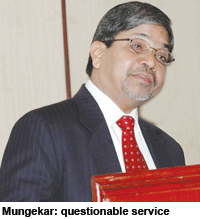 Comments Dr. Bhalchandra Mungekar, former vice chancellor of MU and a former member of the Planning Commission: “Essentially, MU has to resolve six major problems. Three of them are primary in the sense that they are largely responsible for the other three. The primary problems are funding shortfall; negative influence of a corrupt political system; and planning and implementation. These problems have weakened university administration, resulting in poor teaching and learning outcomes; diminished research and consultancy work, resulting in questionable service to the community. At a single-digit percentile of the state budget, the funding figures for the university, especially in the past three decades, explains the poverty of MU and the concomitant dip in standards. Mostly affected are infrastructure; knowledge facilities; research funding; recreational facilities; and welfare packages for lecturers, administrative staff, and students. As a result, many students these days go through the university without the university going through them.”
Comments Dr. Bhalchandra Mungekar, former vice chancellor of MU and a former member of the Planning Commission: “Essentially, MU has to resolve six major problems. Three of them are primary in the sense that they are largely responsible for the other three. The primary problems are funding shortfall; negative influence of a corrupt political system; and planning and implementation. These problems have weakened university administration, resulting in poor teaching and learning outcomes; diminished research and consultancy work, resulting in questionable service to the community. At a single-digit percentile of the state budget, the funding figures for the university, especially in the past three decades, explains the poverty of MU and the concomitant dip in standards. Mostly affected are infrastructure; knowledge facilities; research funding; recreational facilities; and welfare packages for lecturers, administrative staff, and students. As a result, many students these days go through the university without the university going through them.”
Given the sorry condition to which this once-reputed varsityhas been reduced, it’s not surprising that in 2008 a University Grants Commission (UGC) committee had recommended that the Centre “absorb” and convert Mumbai University into a Central varsity after an 11th Plan committee accused the state government of neglecting the country’s second oldest university. Former vice chancellor of Andhra University R. Radhakrishnan who headed the UGC committee told a Times of India reporter (May 17, 2008): “There has been a huge drop in faculty members, which has affected the quality of teaching and research. While the number of students has steadily gone up, over 200 faculty positions are lying vacant. Also, with over 600 colleges affiliated to it, the focus is more on administration than academics.”
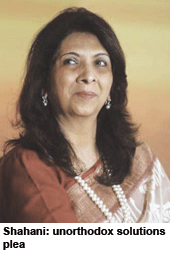 Dr. Indu Shahani, principal, H.R. College of Commerce and Economics, and sheriff of Mumbai, believes the time has come for applying unorthodox solutions to resuscitate MU. “Persistent political interference has severely damaged Mumbai University’s academic standards and reputation. Therefore the first reform required is autonomy of the MU senate whose members should be genuine academics and educationists, not political appointees. Second, the vice chancellor and all faculty appointments must be made on merit, and transparent processes of governance and accountability established. Third, the problem of severe faculty shortages needs to be addressed immediately to restore reasonable teacher-student ratios. Moreover, the university has to invite public-private partnerships to support new and innovative projects and upgrade infrastructure. And lastly, MU needs to massively use new digital technologies to modernise its curriculum, governance, finance, accounting, examination, enrolment, libraries and laboratories,” says Shahani.
Dr. Indu Shahani, principal, H.R. College of Commerce and Economics, and sheriff of Mumbai, believes the time has come for applying unorthodox solutions to resuscitate MU. “Persistent political interference has severely damaged Mumbai University’s academic standards and reputation. Therefore the first reform required is autonomy of the MU senate whose members should be genuine academics and educationists, not political appointees. Second, the vice chancellor and all faculty appointments must be made on merit, and transparent processes of governance and accountability established. Third, the problem of severe faculty shortages needs to be addressed immediately to restore reasonable teacher-student ratios. Moreover, the university has to invite public-private partnerships to support new and innovative projects and upgrade infrastructure. And lastly, MU needs to massively use new digital technologies to modernise its curriculum, governance, finance, accounting, examination, enrolment, libraries and laboratories,” says Shahani.
Vice chancellor Welukar agrees the university needs a major facelift and improvement in the quality of research and faculty. “In our 2012-13 budget we have made provisions for numerous infrastructure projects such as construction of an examination house, a synthetic athletics track, boys’ and girls’ hostels and refurbishment of university buildings. We are also starting a community college programme in partnership with Coca Cola to reach out to colleges in rural and tribal areas. Moreover, we have undertaken a major initiative to involve India Inc with our academic programmes and infrastructure,” says Welukar.
Unfortunately there’s a ring of deja vu in these pious statements of intent which are unlikely to enthuse MU’s demoralised faculty or students. There’s widespread scepticism whether Welukar, himself a political appointee, will address — let alone root out — rampant political interference and wrest academic autonomy from the state’s corrupt political class, which has scant regard for academic standards and a vested interest in the status quo. Nor is Welukar or the MU administration equipped to address the hot potato issue of raising tuition fees to recharge the university’s feeble income streams, which is the prerequisite of attracting high-quality faculty and upgrading infrastructure.
To regain lost glory and respect in India and abroad, Mumbai University has to shed its parochialism and reinvent itself as Bombay University, a national institution.
Also read: 8 Indian institutes among top 100 in QS Asia University Rankings







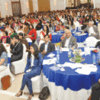









Add comment